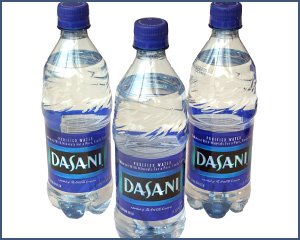Hot ? Thirsty ? Need a drink of Water ? - Take care if you do

University of North Carolina researchers found that ;
1. 20% of daily calories consumed are from beverages.
2. Half the excess calories consumed are from beverages, often with added sugar.
3. Sugared beverages have increased as portion of the daily US diet from 50 cals. in 1977 and trebled to 150 calories in 2001. - that's 15lbs body weight per year.
Many people have therefore turned to the healthy (?) alternative and swagger down and round the gym clutching their fancy bottled water.
So, in 2005, US consumers spent $10.1 billion to drink nearly 8 billion gallons of bottled water -- that's 26 gallons per person -- and paid more per gallon than for gasoline. If you buy and drink bottled water in the US - read on, you might change your mind.
A four-year study by the Natural Resources Defense Council (NRDC), an environmental advocacy group, found 60 to 70 percent of the bottled water sold in the United States is exempt from FDA bottled water standards,(because bizarrely FDA says its rules do not apply to water packaged and sold within the same state), including carbonated water, seltzer, Club soda, tonic water as well as flavored and fortified waters. "Even when bottled waters are covered by FDA's specific bottled water standards, those rules are weaker in many ways than EPA (Environmental Protection Agency) rules that apply to big city tap water," the NRDC found.
For example most cities using surface water have had to test for Cryptosporidium or Giardia, two common water pathogens that can cause diarrhea and other intestinal problems (or more serious problems in vulnerable people), yet bottled water companies don't have to do this. City water tests have to be undertaken by certified labs but most bottlers test in house.
Tap water can't contain fecal coliform bacteria and is tested 100 times or more a month for these pathogens. Amazingly bottled water doesn't face these rules and is only tested once a week. Public water systems report their test results, "none of the bottled water test results have to be made public.
The FDA examined the feasibility of asking bottled water companies to provide test results to the public and concluded "that it wasn't feasible," says the Bottled Water Association (It is in the EU). But because bottled water is an FDA-regulated product, they say that if a product was "out of compliance it would not be available in the marketplace." Consumers who want to see test results "can contact the company directly."
In the UK Drinking Water Quality is regulated by The Drinking Water Inspectorate which was formed in 1990 and acts as the independent regulator of the quality and safety of drinking water supplied by the water companies in England and Wales. The powers and duties of the Inspectorate come from the Water Industry Act 1991, as amended by the Water Act 2003.
They produced their 16th Annual report on 28th June 2006 for the year 2005.99.96% of tests met the required standards compared with 99.94% the previous year. Whatever it costs , it can be relied upon to be clean and healthy.
UK bottled drinking water must conform (as do all EU countries) with European Union's (EU's) bottled natural mineral water standards which regulate total bacteria count, and explicitly ban all parasites and pathogenic microorganisms, E. coli or other coliform bacteria, fecal streptococci (e.g., Streptococcus faecalis, recently renamed Enterococcus faecalis), Pseudomonas aeruginosa, and sporulated sulphite-reducing anaerobic bacteria.
Unlike the weak FDA regulations, the EU rules require natural mineral bottled water's labels to state the composition of the water and the specific water source, and mandate that only one water label may be used per source of water. Similarly, recent EU standards applicable to all bottled water also are far stricter than FDA standards.
FDA's standards for certain chemicals (such as arsenic) also are weaker than certain World Health Organization (WHO) guidelines.
International Bottled Water Association (US)website has some useful information.

1 comment:
Why don't bottled water vendors analyse one another's products? Similarly with Sudan Red contamination: it would be a huge coupe for say, Tesco to find a contaminated product sold by Asda. Perhaps calls for the gov 'to do something about' means that nothing gets done: the gov are too crap to do anything properly and there isn't any expectation for supermarkets to check one anothers products.
Post a Comment